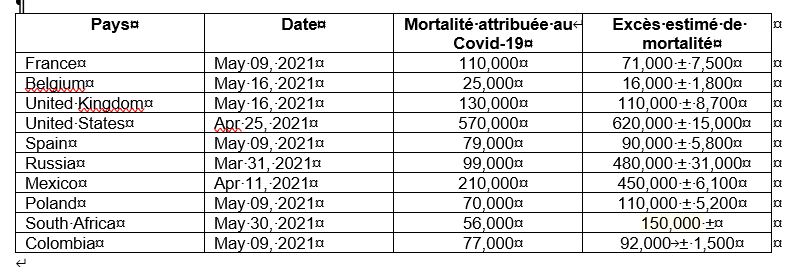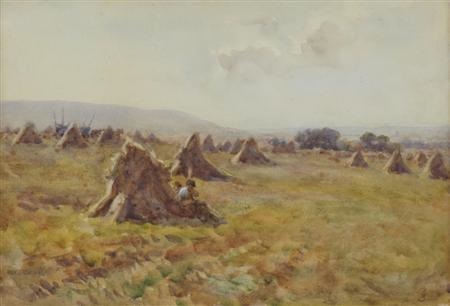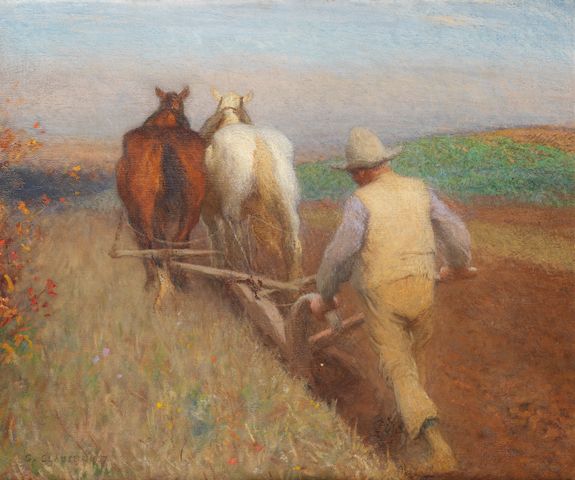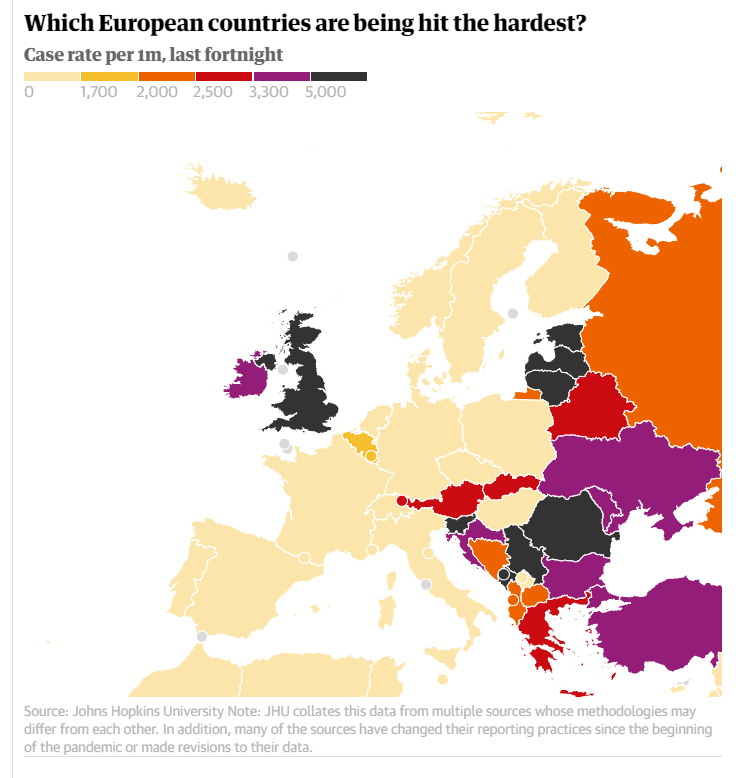|
You
can also view the message online
|
|||||||||||
 Châtenay-Malabry (FR - 92290), October 18, 2021 EFITA newsletter / 1009 - European Federation for Information Technology in Agriculture, Food and the Environment Do not miss the Virus Jokes in English and French The informatique-agricole.org site now offers you the possibility of subscribing the RSS feeds of its two newsletters See RSS feeds to implement to ensure that you continue to receive this newsletter To unsubscribe this newsletter, please contact me directely: guy.waksman(a)laposte.net if this link Unsubscribe does not work. Please note that I changed the presentation of the links that are embedded in the name of the web service. 
To correspond with me (GW), please use this address: guy.waksman(a)laposte.net To subscribe the efita newsletter (please ask your friends and colleagues to test this link) Efita Newsletters subscription Before computers... Weekly newsletters about ICT in Agriculture in English and French Both newsletters have around 14000 subscribers. >>> Last weekly EFITA Newsletters in English (created in 1999) Efita Newsletters >>> Last weekly AFIA Newsletters in French (created more than 20 years ago in 1997) Afia Newsletters >>> Statistics for the last efita newsletter >>> Last issue of the afia newsletter >>> Last available satistics for the afia newsletter Nothing is more responsible for the good old days than a bad memory: An old woman by Sir Georges Clause Joint ISAF & Plant4All & Agriculture 4.0 conference 2021 20 – 21 October 2021- Virtual The 25th International Conference on Information Systems for Agriculture and Forestry (ISAF) & 14th Geomatics in Projects & 6th annual conference of Plan4All together with the conference Agriculture 4.0 is keeping the virtual format this year still due to the worldwide situation with Covid-19. The main virtual event will be held on Wednesday 20th October 2021 held in Czech and on Thursday 21st October 2021 held in English. > Free of charge registration of participants > Preliminary program Agrihub INSPIRE Hackathon 2021 is here! See video Learn more about challenges and register for your favorite challenge(s)! Contact: Sarka HORAKOVA E-mail: horakova(a)wirelessinfo.cz 6th Edition of Future of Biogas Europe 2021 24 - 25 November 2021 - Berlin, Germany Renewable gases are essential for the defossilisation of the energy sector and the realisation of the EU 2030 climate targets. The EU Green Deal has set the framework for the energy transition and now is the time to turn these goals into reality. The global challenges we are facing can be turned into an opportunity to build future resilience based on sustainability. Through a green recovery, the EU will be able to boost innovation, undertake the restructuring of critical sectors and accelerate the implementation of climate goals. See future-biogas-europe The World Mortality Dataset: Tracking excess mortality across countries during the COVID-19 pandemic, by Ariel Karlinsky and Dmitry Kobak Cet article (NIH preprint - US NIH National Institutes of Health) montre que la seule façon de comparer l'impact de la pandémie est bien l'excès de mortalité, ce que je ne cesse de clamer depuis que j'ai découvert cette méthode sur les sites de The Economist et du Financial Time. Si on voit bien ceux qui ont minimisé l'impact de la pandémie (les tricheurs), on trouve des situations curieuses en France ou en Belgique. COVID-19 update: How many more people have died during the pandemic than we would have normally expected? The number of deaths — from all causes — during the pandemic above and beyond what we would have expected to see under “normal” conditions is known as excess mortality. Excess mortality gives a more comprehensive picture of the total impact of the pandemic on deaths than the confirmed COVID deaths alone. Most countries have experienced more deaths than expected, and some far more. In Brazil, for example, there have been roughly 650,000 excess deaths since the beginning of 2020. > Explore our global vaccination dataset, alongside cases, deaths, hospitalizations, testing, and other metrics by country in our COVID Data Explorer. Economia Agro-alimentare / Food Economy, An International Journal on Agricultural and Food Systems Economia agro-alimentare/Food Economy is a triannual peer-reviewed scientific journal published by Franco Angeli Edizioni on behalf of the Italian Society of Agri-food Economics (SIEA), founded in 1996 by the then President of SIEA Fausto Cantarelli. It offers an international forum for the discussion and analysis of mono and interdisciplinary socio-economic, political, legal and technical issues, related to agricultural and food systems. Ver economiaagroalimentare.it Bushel Acquires GrainBridge The acquisition will further connect the grain industry creating a network effect for more than 40% of the grain origination in the U.S. and Canada. See precisionag.com Apps and Infrastructure in Agtech A new perspective on the past 40 years of agtech and what it means for the future. See precisionag.com Precision Agriculture Proves to Be Right Fit for Australian Service Provider Providing extensive precision agriculture services has proven to be a point of difference for Victorian contractor Arron Daniel. See precisionag.com The Future is Now: Advances in Agricultural Robots, by Dr. Khasha Ghaffarzadeh IDTechEx Research Director Dr. Khasha Ghaffarzadeh explains how enhanced algorithms and artificial intelligence help improve life on the farm. These days, it’s rare to find an industry untouched by artificial intelligence. From the machine learning that predicts customer behaviors and purchasing patterns to the machine vision that drives facial recognition technology, everyday life is filled with examples of algorithms and automation at work. Even the hardware has become somewhat ubiquitous. Robots assemble cars for the automotive industry, assist surgeons during medical operations, vacuum floors for busy homeowners. While some industries like agriculture are generally slower to adopt new technologies, big changes are afoot. Agricultural robots are already in operation on farms around the world, disrupting the industry in new and different ways. Dr. Khasha Ghaffarzadeh, IDTechEx Research Director and author of “Agricultural Robots and AI: A Question of When and Not If,” discusses some of the futuristic things he’s seeing right now. …/… See agricultural-robotics.com Bushel acquires GrainBridge from ADM & Cargill, AFN, by Jennifer Marston US grain trading platform Bushel has acquired GrainBridge, its counterpart that’s a joint venture of agribusiness giants Cargill and ADM. GrainBridge will eventually become part of Bushel’s software offering, adding a data science component the companies say will help farmers and grain buyers make more informed decisions and ultimately become more profitable. .../... Launched in 2017, Fargo, North Dakota-based Bushel aims to digitalize the grain industry via its software platform that integrates different systems in the grain supply chain – from accounting and insurance to farm management and trading desks. It says about 40% of the grain US farmers initially sell into the supply chain comes through its platform, which now powers about 2,000 grain facilities across the US and Canada. Using Bushel, farmers can view their grain contracts and see when they can expect to get paid, pricing, and bids. The startup has been adding to its grain trading platform over time, including the acquisition of farm management app FarmLogs earlier this year. .../... See agfundernews.com FYTO: The startup growing protein with robots to decarbonize agriculture, AFN, by Louisa Burwood-Taylor …/… Enter FYTO, a US agtech company producing aquatic plants in a controlled and automated environment. FYTO’s crops, which include a type of duckweed called lemna, can be used as a protein-rich alternative for traditional animal feed ingredients, plant-based foods, biofertilizers, and soil amendments, and can be produced nearly anywhere in the world with minimal human intervention. …/… So much of the rhetoric surrounding agriculture’s impact on the climate centers on the meat and dairy industries, and rightly so; animal agriculture accounts for 14.5% of global greenhouse emissions, not far behind the most obvious emitter, transport. If you’re reading AFN, you’ve no doubt read about the numerous innovations looking to replace animal products with plant-based, fermented, or cell-cultured alternatives. And according to various data, consumers are turning increasingly towards those categories. While these are exciting, there are major question marks lingering over their potential from a scale and cost perspective. .../.. >>>> How FYTOfeed can reduce animal feed’s carbon footprint - By producing locally, often on the livestock operation itself, FYTOfeed can eliminate transportation-related emissions (and costs) associated with the ingredients they are substituting for, many of which are shipped cross-country or overseas. - By utilizing and upgrading animal manure, FYTO captures carbon and nitrogen that would otherwise enter the atmosphere and groundwater. It also allows farmers to completely avoid the use of synthetic fertilizers, which have a heavy carbon footprint as well as other environmental concerns like runoff and associated algal blooms. - By providing feed ingredients that are nutritionally dense and highly digestible, FYTO thinks it can reduce emissions from the animals themselves. The company is actively testing this factor now; “early tests indicate we could make a big dent in the enteric emissions of these operations,” Prapas tells AFN. - Since FYTO doesn’t require arable land and uses a much smaller area to produce crops, it can remove pressure on forests. - In some scenarios, FYTO can even be carbon negative as it stores carbon by using cow manure as the main feedstock for its aquatic plants, which can be turned into fertilizer — when not used as feed — completing the cycle and storing carbon in the soil. See agfundernews.com/ Nothing is more responsible for the good old days than a bad memory: An Autumn Morning, Ploughing by Sir George Clausen, RA, RWS (British, 1852-1944) Future Farming (NL) > Smart farming innovations on show at EIMA The EIMA Show, makes a welcome return to Bologna, Italy from the 19-23 October. Alongside the vast array of conventional machinery on display, the event also plays host to EIMA’s Technical Innovations competition. Here we take a quick look at some of the interesting ideas on the EIMA Show. > Help complete our robot and autonomous tractor catalogue > Commercial robotic asparagus harvester on the way > Who is afraid of autonomous tractors? > Kubota to acquire AgJunction > Video: 15 impressive farming robots | Part 2 Now online: part 2 of our field robot catalogue series. This Youtube video shows 15 of the 30+ field robots from our catalogue. The video is meant for easy comparison and to learn more about the robots available on the market. > Buyers’ guides: Help complete our robot and autonomous tractor catalogue Future Farming is on a quest to update and complete its catalogues and buyers guides of field and harvest robots and autonomous tractors for 2022. > Market trends: Smart agriculture market to grow to USD 22.0 billion by 2025 According to a research study by MarketsandMarkets, the market for smart agriculture is expected to reach USD 22.0 billion by 2025. > Field robots: Agerris weeding robot fleet growing rapidly Agerrisnow has four Digital Farmhands working on farms in Queensland, eight in Victoria and one in New South Wales. > Business update : Kubota to acquire automation company AgJunction AgJunctio has entered into a definitive arrangement agreement to be acquired by Kubota Corporation. See futurefarming.com Nothing is more responsible for the good old days than a bad memory: His Father's Grave by Jozef Israëls Greeneye Launches AI Precision Spraying Technology Commercial launch takes place in Israel, with roll-out in North America set to follow in early 2022. See precisionag.com Q3 2021 AgTech Venture Capital Investment and Exit Round Up Last quarter set a record for venture capital investments into AgTech startups. See precisionag.com What Retailers, Coops and Producers Should Know about This Data Integration Tool APIs are the powerhouse of agribusiness, the digital pipeline that connects data to enable new applications. But don’t make the same mistake as agribusinesses that have spent thousands to rework their entire applications, believing that APIs are plug and play solutions. Here’s the reality. See precisionag.com Why Toyota Ventures invested in Burro’s farm robots, AFN, by Jennifer Marston At the tail-end of last month, US-based startup Burro, which makes farm robots that aid human workers, announced a $10.9 million series A round of funding co-led by VC firm S2G Ventures and Toyota Ventures. For the latter, ag tech is new territory when it comes to investing — though one we’ll likely see the company contribute more dollars to in the future. “We look at big broken markets that are open to disruption, and agriculture is a big broken market that I think is getting more and more open to disruption,” Jim Adler, the founding managing director at Toyota Ventures, tells AFN. “When we met the Burro team, we really resonated with this idea that this is a simple, straightforward task that probably everybody in the agricultural industry has.” Burro, founded in 2017 as Augean Robotics, makes farm robots that can follow workers around and automate certain tasks for specialty crops. The bots use artificial intelligence and machine learning to navigate autonomously to where they are needed on the farm. For now, their biggest job is to help carry harvested fruit like table grapes, berries, and nursery crops, See agfundernews.com/ Asia, LatAm dominate H1 investment into Agribusiness Marketplaces Data Snapshot! AFN, by Jack Ellis The world’s top-funded Agribusiness Marketplaces startup in the first half of this year was in Indonesia, reflecting the Southeast Asian country’s growing presence in the global tech and VC ecosystem. See agfundernews.com/ Nothing is more responsible for the good old days than a bad memory: Collecting Sticks by Josef Süss (1867 – 1937, Austrian) Manure and Soil biodiversity In the European Union (EU-27) and UK, animal farming generated annually more than 1.4 billion tonnes of manure during the period 2016–2019. Of this, more than 90% is directly re-applied to soils as organic fertiliser. We reviewed the impact of manure from farmed animals on soil biodiversity by considering factors that determine the effects of manure and vice versa. In this review paper we explored the impact of manure from farmed animals on soil biodiversity and vice versa. This review considered 407 published papers and relevant legislative provisions. In addition, we evaluated whether benefits and risks on soil biodiversity are considered in manure management. This dataset includes the spatial distribution of manure in EU and UK (per country, animal type) plus the database of the literature used: See esdac.jrc.ec.europa.eu Controlling weeds requires balance and technology helps, by Nancy Kavazanjian Whether you garden, farm or do both, weeds are a perennial problem, and my Wisconsin garden and farm fields are no exception. Controlling weeds is all about balance: We must balance the needs of the plants we want to grow and those we don’t. It doesn’t matter if we are growing tomatoes and peppers in our garden or corn, soybeans and wheat in our fields. We need fertile soil, water, and sunlight for the plants to grow and prosper while keeping unwanted pests, like weeds, insects and disease to a minimum. .../... See globalfarmernetwork.org/ Energiekrise: Das Ende für den Green Deal? Von Dr Olaf Zinke, agrarheute Der Anstieg der Energiepreise sei für EU-Bürger und Unternehmen "unerträglich" geworden und erfordere eine "europäische Antwort", sagte Bruno Le Maire, Frankreichs Wirtschafts- und Finanzminister. Stehen Green Deal und Energiewende jetzt auf der Kippe? Sehen agrarheute.com Mehr Methan und weniger Kühe? Die Kuh als Klimakiller ist schwer zu argumentieren. Sehen ooe.lko.at Why Americans Die on Donuts while the French Thrive on Pastries, by Dave Smurthwaite The moralities and mindsets of stuffing your face. .../... In France, what Mamie thinks about second pastry matters because it’s morally wrong. It was about character, not calories for our seven-year-old friend. It was akin to smoking a cigarette behind the elementary school grounds in the United States. That’s because over-indulgence is seen as a disease in France, which it is. In America, we too often consider it a right, a pastime, or, even worse, an antidote to the woes that come from our non-stop pace of life. If only everyone had Mamies in the French countryside, we might all be 20 pounds lighter. And we might all get to eat French pastries every day. Obesity in Europe TrusTrace scores $6m to bring sustainability & traceability to agrifood supply chains, AFN, by Jack Ellis Swedish software startup TrusTrace has raised $6 million in Series A funding. The round was co-led by Industrifonden and Fairpoint Capital, with participation from BackingMinds and Fashion for Good. “Industrifonden and Fairpoint Capital are the perfect partners to accelerate our growth and drive the global expansion of our sustainable platform. We are also thrilled to continue collaborating with Backing Minds, who were our first investors, and Fashion for Good,” TrusTrace CEO Shameek Ghosh said in a statement. “Together with our partners, we can continue helping brands discover suppliers and map the complete supply chain from source to end-product.” Founded in 2016, TrusTrace uses artificial intelligence and blockchain technology to enable “product-level traceability” that can help enterprise customers in the the food, fashion, and retail sectors to make “better, more sustainably conscious and socially responsible sourcing decisions,” Ghosh said. https://agfundernews.com/trustrace-scores-6m-to-bring-sustainability-traceability-to-agrifood-supply-chains.html See agfundernews.com/ CarbonSpace raises $1m seed funding to measure carbon footprint of food & forestry, AFN, by Louisa Burwood-Taylor …/… The carbon footprint of the food and agriculture industries is under the spotlight more than ever. Consumers and governments have started demanding more transparency around the climate impact of different products and services. Companies of all sizes have jumped on the opportunity of providing that transparency through new approaches and practices — see the big agrifood companies‘ regenerative farming commitments as an example — to new technologies promising to pay farmers for sequestering carbon in their soil, and helping them to do it. The latter centers around verification of how much carbon is in the soil, and ranges from drone and satellite imagery, to soil sampling technology, to marketplace tools. And it’s complicated stuff, with large amounts of variance between different geographies, soil types, and even within a single field. Furthermore, there’s the issue of knowing how long carbon will stay in the soil — permanence — and how long it was there before any verification happened, which makes accuracy and precision a big challenge to contend with. …/… See agfundernews.com/ Nothing is more responsible for the good old days than a bad memory (?????): The Little Shepherd by Jozef Israels (1824 - 1911) Between 1960 and 2014, global carbon emissions per dollar of GDP fell by 41 percent This trend is largely the result of businesses’ constant efforts to reduce their energy costs. In other words, the capitalist solution to climate change is working. Nothing is more responsible for the good old days than a bad memory: Bietenoogst (detail) von Emile Claus 1849-1924
UK’s high Covid case rates buck trend as western Europe outperforms east, by Jon Henley Europe correspondent in The Guardian (UK) Slower vaccination rates in east lead to dramatic surge in cases, while UK remains outlier in west. Hypnosis [ENGLISH] Building a Nature-Positive Economy, Apr 28, 2021, by Paul Polman & Eva Zabey Investors often chase short-term profits instead of using environmental, social, and governance criteria – alongside financial performance – to measure a company’s value. There will be no saving the planet from the ravages of climate change and biodiversity loss unless this definition of business success changes. First, we need meaningful and credible ESG (environmental, social, and governance) data alongside traditional financial reporting in order to counter accusations of greenwashing. Corporate performance indicators must embed the true value of natural, social, and human capital to reveal the full state of health of the planet, people, and profits. To that end, efforts are underway to develop a globally accepted system for corporate disclosure of both financial and sustainability information. Second, all investors should stop investing in activities that have a highly negative impact on the climate and biodiversity, and they should call for companies in their portfolios to issue reports aligned with the Task Force on Climate-Related Financial Disclosures and the more recently established Task Force on Nature-Related Financial Disclosures. BlackRock, the world’s largest asset manager, has asked all firms in its portfolio to do this by the end of 2020, and a group of major investors worth $4.7 trillion has committed to making their portfolios zero-carbon by 2050. In addition, the US Securities and Exchange Commission recently established a Climate and ESG Task Force charged with monitoring listed companies’ conduct in these areas. Lastly, and perhaps most important, governments must implement ambitious policies that reflect a vision of the sustainable economy to which we aspire. Such measures could not only unlock new business opportunities but also create a level playing field and stable operating environment. In the run-up to the United Nations Biodiversity Conference (COP15) scheduled to take place in China in October, more than 700 companies are urging governments to adopt policies now to reverse nature loss by 2030. And just recently, the UN adopted a landmark framework to integrate natural capital into economic reporting. The coming post-pandemic recovery gives the world a chance to embrace such reforms. We must rewire our economic system and reward sustainable, long-term performance that goes beyond financial returns. See project-syndicate.org Nothing is more responsible for the good old days than a bad memory: Kinder beim Mittagessen After Class, von Benjamin Vautier (1829 – 1898, Swiss)
Concentrate farming to leave room for species and carbon (Andrew Balmford, Prof. University of Cambridge, FRS) Farming should be as high-yield as possible so it can be limited to relatively small areas, allowing much more land to be left as natural habitats while still meeting future food targets, according to a major new analysis of over a decade of research. Most species fare better under this “land sparing” approach than if farming tries to share land with nature – as wildlife-friendly agriculture still damages most biodiversity and requires far more land to produce the same amount of food. This is the conclusion of research that takes into account over 2,500 individually assessed plant, insect and vertebrate species from five continents. The review, conducted by Prof Andrew Balmford, also suggests that “land sparing” sequesters more carbon, and may well benefit marine life if applied to oceans. “Figuring out how to feed, clothe and power 11 billion people without causing mass species extinction and wrecking the climate is this century’s greatest challenge,” he said. “Preserving diverse life while meeting humanity’s needs will mean enormous trade-offs, but the evidence is starting to point in one direction.” .../... See cam.ac.uk
Honest teacher Two boys were arguing when the teacher entered the room. The teacher says, "Why are you arguing?" One boy answers, "We found a ten dollor bill and decided to give it to whoever tells the biggest lie." "You should be ashamed of yourselves," said the teacher, "When I was your age I didn't even know what a lie was." The boys gave the ten dollars to the teacher. The distribution of this efita newsletter is sponsored by vitisphere.com Please, contribute to the content of your efita newsletter, and advertise your events, new publications, new products and new project in this newsletter. Without your support, it will not survive! Contact: Guy WAKSMAN E-mail: guy.waksman(a)laposte.net To read this newsletter on our web site See Afia The archives of this newsletter See Afia About the EFITA mailing list You can use the efita moderated list (> 15000 subscribers) to announce any event / product / web site / joke (!) related to IT in agriculture, environment, food industry and rural areas. If you want to subscribe a friend, please fill in his form. If you do not wish to receive our messages, please fill in the following form... |

















